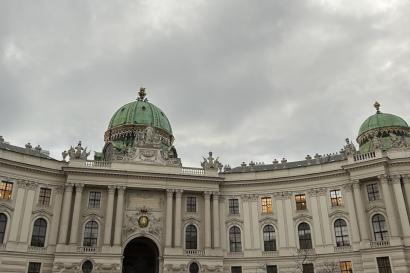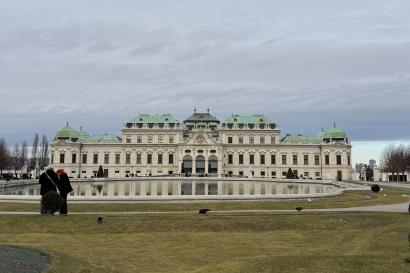I have a poster on my dorm wall at school that reads, “Isn’t the music sometimes so beautiful it hurts?” I’ve thought of that question many times before, and this weekend may have been one of the most powerful.
The entire music program took an overnight trip to Steinbach-am-Attersee, a tiny town of 850 inhabitants, which is the home of a hotel at which Mahler stayed for four summers, finishing his second symphony and composing the entirety of his third. We stopped in several other places, relevant to the lives of Lehar, Brahms, Kaiser Franz Joseph, and more, but Attersee was our final–and for me, most important–destination. On the bus ride out of Vienna, I listened through Mahler’s Third Symphony for the first time (thank you, Spotify Premium), and literally wept. On the bus.
The lake and the surrounding mountains were absolutely gorgeous, and it was all the more magical to think that Mahler stood on that same dock, gathering inspiration for one of the most monumental works in symphonic history. As a student of art history, I am always so taken aback by the opportunity to stand in a museum and be inches away from the canvas that a great master painted on, and while looking at a manuscript is comparable for music, I found it to be more poignant for me to be in the place where Mahler literally was when he composed this symphony.
After our dinner, the owner of the hotel, with whom Morten Solvik (the director of IES Vienna and a Mahler scholar) is quite close, offered to take us all out onto the lake in his personal boat, which was absolutely breathtaking. An added touch was that the owner played cassette tapes of Mahler’s Third on the ride.
We then gathered together to discuss Mahler for a while, and then to watch a documentary about his third symphony. Professor Solvik gave one of the most riveting lectures I think I’ve ever heard prior to the movie, discussing Mahler’s background and historical context, as well as his conception of the value of art and music. This was especially meaningful for me, as I have struggled for several years now to come to terms with the place that the arts have in my life and to find value in the possibility of a life in the arts. It’s one of the reasons I came to Vienna, in fact.
The subsequent documentary, in addition to being very informative, was an argument for why I can’t not have the arts involved in the rest of my life at least in some way; the final minutes of the movie were simply the end of the final movement of the third symphony, through which I was bawling uncontrollably. And in that moment, I understood how music could be so beautiful that it hurt.




Isaac Alter
<p><span style="color: rgb(29, 29, 29); font-family: Arial, Verdana, sans-serif; font-size: 12px; line-height: normal; background-color: rgb(237, 237, 237);">My name is Isaac Alter, and I'm a rising junior at Harvard College, studying stem cell biology with a double minor in art history and music. Outside the classroom, I work both as an admissions tour guide and as a research associate in a stem cell lab, I am a music director for the Harvard-Radcliffe Dramatic Club, and I am a flutist and board member for the River Charles Ensemble, a conductorless chamber orchestra. I'm beyond thrilled to be taking a journey to Vienna this summer, to pursue and explore music--one of my great passions--in what has been the center of classical music for centuries. In my free time, I love taking spontaneous trips to New York, cooking, and exploring nooks and crannies of Harvard's vast campus. My career plans at this point are wildly up in the air, but I hope that my experience with music this summer will help me on that front.</span></p>








